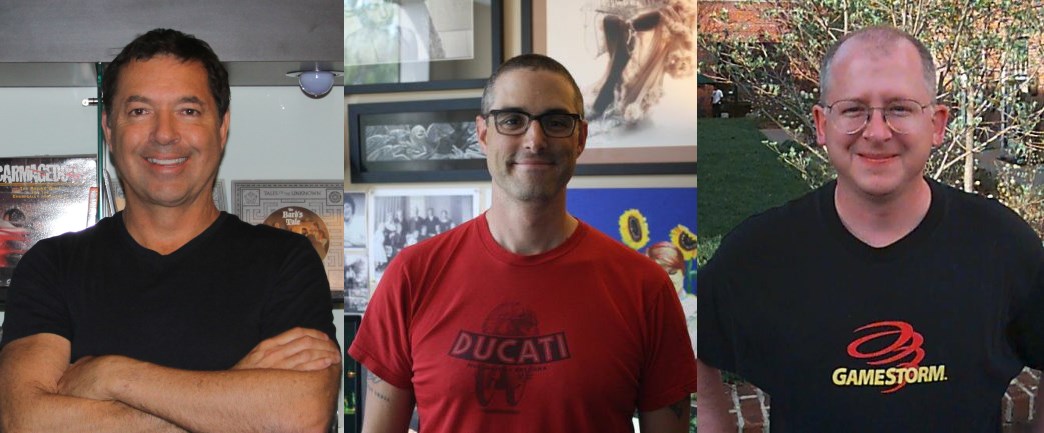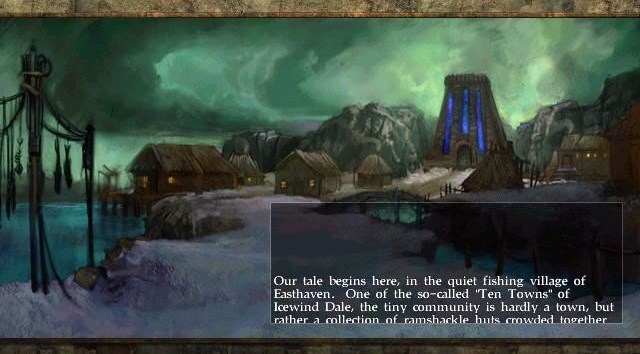Brian Fargo, Josh Sawyer, and Gordon Walton on the history and future of RPGs

Brian Fargo (Wasteland, Fallout), Josh Sawyer (New Vegas, Pillars of Eternity), and Gordon Walton (Ultima Online, Star Wars: TOR) are veterans of the videogame business and have, between them, worked on some of the most beloved RPGs ever to grace the PC. Fargo and Walton got their starts all the way back in the 1980s, and all three have more recently been at the forefront of the crowdfunded RPG renaissance: Fargo at the head of inXile Entertainment, which is currently working on Torment: Tides of Numenera and The Bard's Tale IV; Sawyer as the game director and lead designer on Obsidian's Pillars of Eternity; and Walton as the executive producer of ArtCraft's upcoming MMO Crowfall.
Instead of talking to each of them individually about their careers making RPGs, I decided to rope them together at this year's GDC and get them to talk to each other. They shared stories about how they make games and their years of experience in the industry. The resulting interview was a long talk about the past, present and future of PC RPGs. I hope you enjoy it as much as I did.
Wes Fenlon, PC Gamer: Are there are any specific things about RPGs, what you guys work on day to day in terms of design and writing, that you’d especially be interested in talking about or asking each other about?
Josh Sawyer: I was the director on [Pillars of Eternity] and I also did all of the world and lore design, and I did all the system design for the game.
That seems like a lot of it. Did you sleep much?
JS: I don’t know. That’s just kind of what I’m drawn to doing. I didn’t do a bunch of story development. I only wrote one character in the game, which is Pallegina. So I tried to avoid being really super deeply involved in a lot of the area design and things like that, because I just didn’t have the time for it. I was the only system designer, and I designed 90 percent of the lore and everything. But then most of the rest of what I was doing—It was an interesting team dynamic, because we had people who had been working on the original Infinity Infinity Engine games, folks that I worked with back at Black Isle, and then we had people that had been at Obsidian for five or six years and so they were pretty experienced with the type of games that we made in general, RPGs in general, and then we had a bunch of new people.
And so getting the old folks back up to speed with making this style of game took a little bit, but we got back into the groove pretty quickly. Then people who had made other Obsidian games, they got some of the basic principles but working within an isometric 2D rendered environment, that took a little getting used to. Designing levels is a different sort of thing there. And then for the new folks it was a very very different experience. Thankfully, we had a lot of fans in the group, so even though they had not worked on games like that, they had played them, and so they were very familiar with a lot of conventions.
Keep up to date with the most important stories and the best deals, as picked by the PC Gamer team.
"It's almost like you have to hold people back making these games, more than spur them on." - Gordon Walton
So were some of the new people on the team people who’d actually been playing Planescape: Torment or something when they were 17?
JS: Sure. Or, like, eight. [laughs] In their case, a lot of them were actually really young when they played them. There are certain considerations when you make something isometric, like the way you design levels and how the geometry works and things like that, that are not intuitive. Don’t have inclines coming up toward the camera, because it completely looks wrong from an isometric perspective. There are certain things like that that we had to teach people, but most of the principles that we use in role-playing games, it’s kind of consistent whether we’re making something like Alpha Protocol, first-person spy game, or Fallout: New Vegas. We focus so heavily on character development, choice and consequence, character building, and I think a lot of those things just carried right over.
World building for new games seems like such an incredibly daunting task to me. When I play some RPGs that are vast, 80-hour-plus games, it’s daunting just as a player trying to incorporate all of this stuff in my head, and that’s not even all the stuff I don’t see that guides the creation of that world. Were you just starting from scratch with that?
JS: We used The Forgotten Realms as the inspiration point, because Baldur’s Gate and Icewind Dale were set in The Forgotten Realms, the classic D&D setting, and so there were certain things that we knew we wanted to capture and experiment with. So in that sense, we weren’t starting completely from nothing. We had inspiration points. But I think with world building you just have to be judicious about where you spend your time, because I think if I had gone through and listed out the 80 emperors of the Aedyr Empire or whatever, no one’s actually gonna wind up using that stuff in the game. The designers aren’t gonna use it, players might find it this interesting, but it’s like, ‘Okay, what’s the stuff the designers are actually gonna be using day to day? What’s important for them to know?'
And it is collaborative too. I was the guy that wrote it, but I was frequently asking questions of other people to get their opinions or ideas and things like that. So trying to do it completely by myself, well, one, it would have been much more difficult, and two, you want the people working with you to be invested in it, and so getting their ideas and opinions is really valuable.

Brian, can you speak to, over your career, building up the world-building process on games and learning how to create worlds?
Brian Fargo: I come at it much differently than Josh, because he’s actually writing the lore right in the trenches of it all. I sort of come at it more as a, ‘What are the touchpoints of the product and the sensibilities of it?' With Wasteland, ‘Okay, we’re gonna do post-apocalyptic. What are the innovations we can make?’ in which case it was open world and those rippling effects. And so I really help set the bar for the kinds of things where we should be spending our effort and energy and what’s important, as you just said, and so where I’ll make the decisions to say, ‘We think that I’m okay with 30 percent of the content in this game that people won’t see.’ And the reason why you have to make that commitment is because you don’t have true reaction to cause and effect if everything’s on the same path.
So I have to say, ‘let’s make sure that you can open up any place on the map at the same time and go there. You’re gonna get your ass handed to you. We think that’s a rewarding experience for you and for the guys that want to try to get that extra weapon.’ So I’m almost more on the philosophical and psychological side of these things than actually writing the words, because I’m not a writer. I know writers, they can write like mad. With Wasteland 2, I did the first map. I actually designed it, I put it in, I put the encounters, but I would put in, ‘This guy says something to this effect,’ because I don’t even think for a second that I could write like a writer can, and then they’ll come in and they fill it in.
I did the same thing with the Bard’s Tale comedy. So most of my time is really focusing on the push points of what is important, or, in the case of Wasteland 2 from Wasteland—we wanted to make the core audience happy, but we also wanted to have new people to be able to experience it too, so what are the things that could come across, what are the inside jokes. And then I do sometimes roll up my sleeves and get into some of the individual stuff that I think that, as a gamer, I will totally get off on, and so I will pick my little battles of stuff that have to be in there. But for the first part I’m coordinating the entire effort of everybody coming in, and making sure the creativity is happening on all fronts, and that I’m letting the egos get out of the way and the best ideas are rising to the surface etc etc. So it’s it’s different than his involvement, probably Gordon’s too for that matter.
Gordon Walton: I think mine’s more on target with yours, Brian. What I’m looking for is, is the creative team going to hit the things that are gonna resonate with the IP that we’re building, and are they in place? And I’ve never seen any lack of creativity among the team members to really bring worlds to life. You say, ‘Oh yeah, we’re gonna do this area,’ and people, within two or three hours of brainstorming, they’ve already imagined more things than we can possibly do that are super cool, and then they’ll put them in, and then we’ll tune it and we’ll test it and go, ‘Well, this one doesn’t play very well. Why didn’t it play very well? Choke points were at the wrong place, or the encounters are not spaced correctly, or I’m not signposted to the right area.’ But on the theme side and on just trying to make it cool, it’s almost like you have to hold people back making these games, more than spur them on. ‘Hey, make it more creative’—No, it’s more, ‘Okay, it’s creative enough. Stop! Stop!’
Next page: The value of Director's Cut updates, and Brian talks about The Sperminator.

Wes has been covering games and hardware for more than 10 years, first at tech sites like The Wirecutter and Tested before joining the PC Gamer team in 2014. Wes plays a little bit of everything, but he'll always jump at the chance to cover emulation and Japanese games.
When he's not obsessively optimizing and re-optimizing a tangle of conveyor belts in Satisfactory (it's really becoming a problem), he's probably playing a 20-year-old Final Fantasy or some opaque ASCII roguelike. With a focus on writing and editing features, he seeks out personal stories and in-depth histories from the corners of PC gaming and its niche communities. 50% pizza by volume (deep dish, to be specific).

